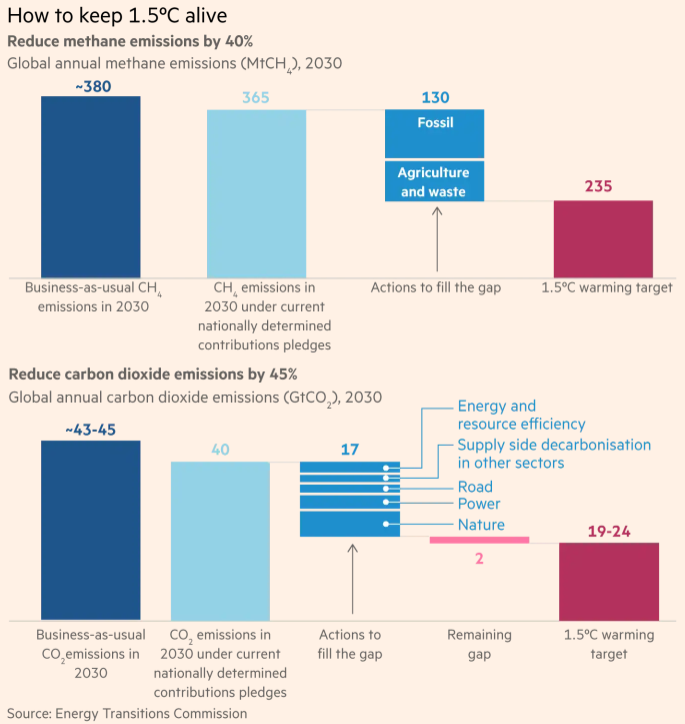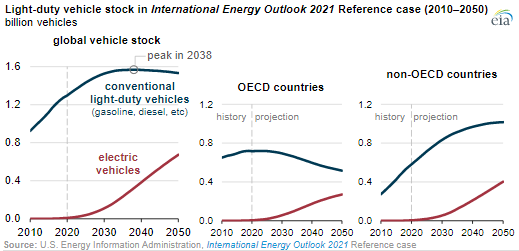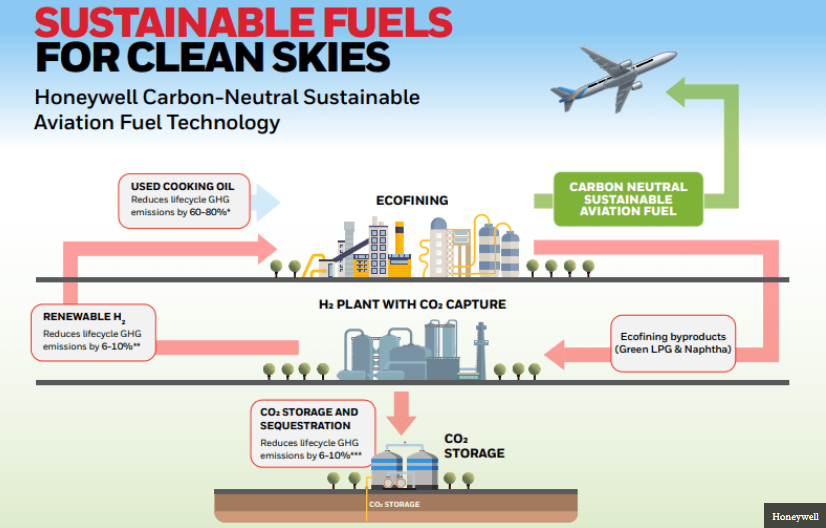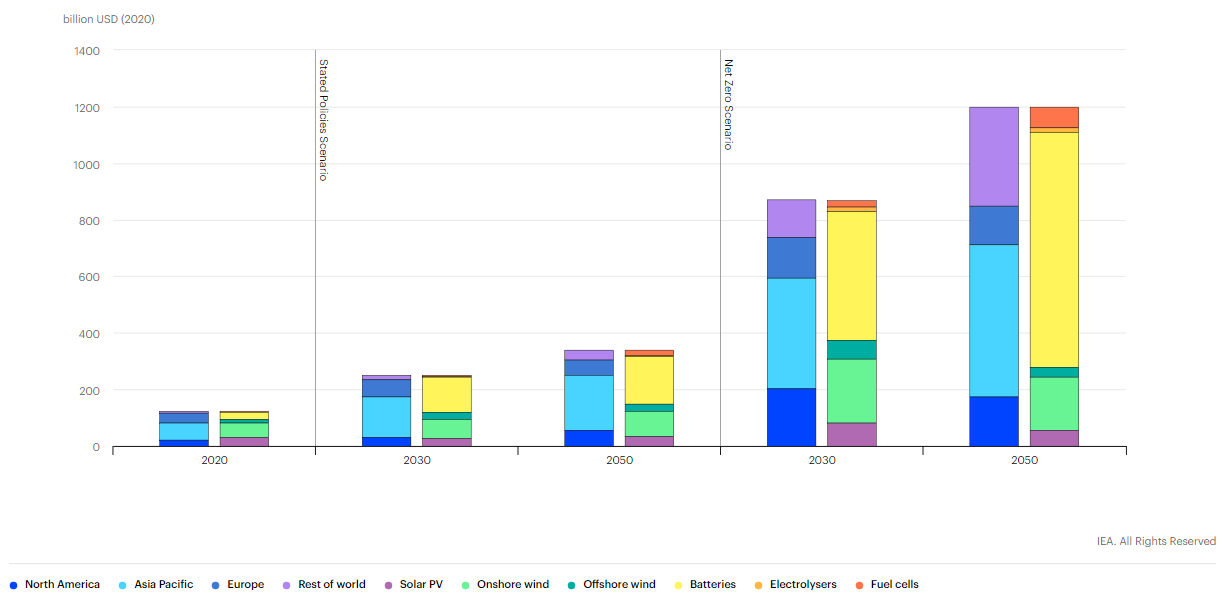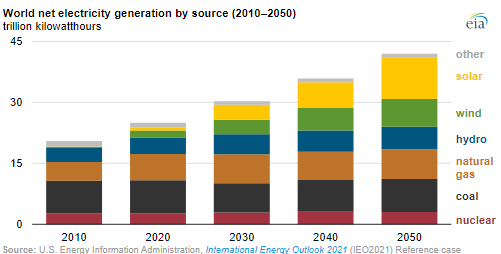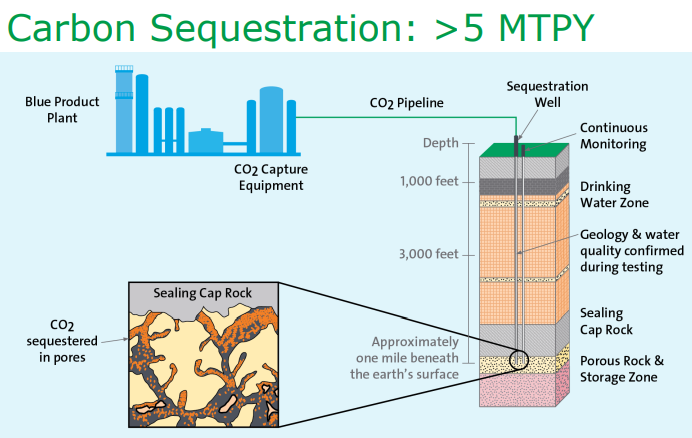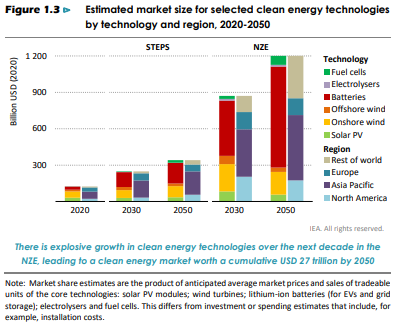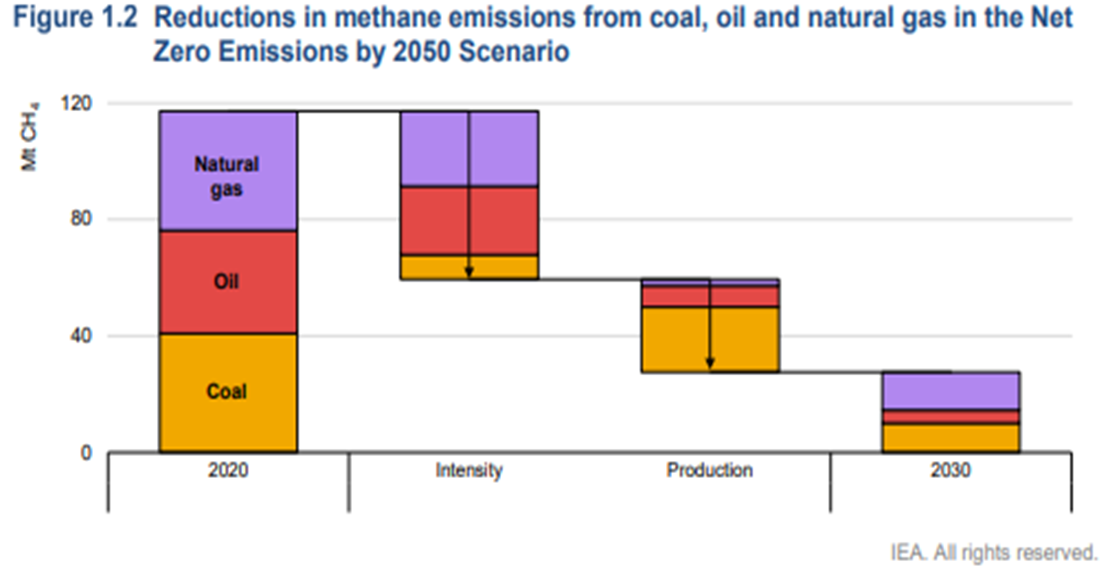Our ESG and Climate Piece today focuses heavily on COP26, which begins this weekend, and has been the subject of many of this week's stories, as attending countries make their concerns and preferences known and as companies and lobbying groups try to be heard. The linked FT article talks about the minimum needs from COP26. We highlight this because we have been talking about the same things for months – the significant gap between what is pledged for 2030 and what is needed, and the need to attack emissions of methane and CO2 aggressively. The methane issue can likely best be achieved through legislation – especially as some of the leaks around the world may not belong to anyone, who could benefit from an incentive or be penalized for the leak. The CO2 emission issue will always be bet addressed through a pricing mechanism on carbon.
COP26: Some Tough Decisions For A Divided Group
Oct 27, 2021 1:44:48 PM / by Graham Copley posted in ESG, Sustainability, Methane, CO2, Net-Zero, methane emissions, COP26, Climate Goals, CO2 emissions, carbon pricing
Gevo: Ticking All The Boxes To Be A Sustainable Fuel Provider
Oct 26, 2021 12:48:37 PM / by Graham Copley posted in ESG, Sustainability, CO2, Carbon, Gevo, Chevron, gasoline, sustainable aviation fuel, renewable fuels, Sustainable Fuel, Axens, ADM
Gevo is racking up the agreements to produce sustainable fuels, announcing deals with Chevron, Axens, and now ADM since September. Our view on the need for sustainable aviation fuel is that everyone building will likely be capital constrained relative to the potential demand – this is also true for sustainable diesel and gasoline, which is relevant given that the EIA sees the conventional light vehicle stock peaking globally as late as 2038 (this is not inconsistent with other estimates we have seen) see chart below.
Fly Me To The Moon - Sustainably Please...
Oct 22, 2021 1:18:10 PM / by Graham Copley posted in ESG, Sustainability, CO2, climate, waste oil, vegetable oil, EVs, aviation fuel, gasoline, sustainable aviation fuel, renewable diesel
We have spent a lot of time in our ESG and Climate work talking about the huge impending challenge of producing enough sustainable aviation fuel to meet airlines desired needs for 2030 and beyond and we highlighted a Ryanair release yesterday that suggested that the company would struggle to meet its 12.5% goal by 2030. The Honeywell schematic in the exhibit below is one of many different processes that are being considered to meet both the demand for sustainable aviation fuel and renewable diesel and gasoline demand. With gasoline more likely to be replaced with increased numbers of EVs over time, we believe that the sustainable fuel focus will switch to aviation as the main priority, and we will need every technology that we can get to meet the volume needs. Waste oil and vegetable oil, with carbon capture around the refining process, is one route, fermentation-based processes are another, and waste to oil is a third, although we remain skeptical about the reliability and economics around a waste gasification-based approach.
Dow And Air Products Have Got The Ball Rolling, But How Fast?
Oct 21, 2021 1:54:22 PM / by Graham Copley posted in ESG, Hydrogen, Sustainability, Polyethylene, Blue Hydrogen, Air Products, decarbonization, Dow, climate, low carbon polyethylene
The Dow chart below was included in the presentation around the Canada project and repeated today in the earnings call. We have talked about the Canada project at length as well as the more recently announced Air Products blue hydrogen project in the US. The more interesting debate from here is what will happen next. Are Dow’s and Air Product’s phones ringing off the hooks with potential customers saying “we want some of that”, or is it quieter? We suspect that the phones are ringing and ringing a lot. Perhaps because people genuinely want the low carbon polyethylene or hydrogen, but also perhaps because users of polyethylene and hydrogen are likely obligated to find out more so that they can explore both the opportunities of buying from Dow or Air Products, or evaluating what their alternatives might be. We suspect that a surge in genuine customer interest is likely, good for both Dow and Air Products, but also good for others either considering decarbonizing projects or offering a carbon-free alternative already. See our ESG and Climate piece from yesterday for more on this.
The COP26 Challenges Go Beyond Net-Zero
Oct 20, 2021 2:02:43 PM / by Graham Copley posted in ESG, Sustainability, CO2, Carbon, Emissions, Net-Zero, IEA, carbon value, COP26, Climate Goals, Paris Agreement
The Financial Times opinion piece linked in the bullet below and from which the chart is taken has used the IEA data that we have featured in recent work. The piece comprehensively walks through how the world is likely to come up short, and while it gives the measures that are needed and the money that likely needs to be spent, it is not an optimistic review of what will most likely occur. We remain firmly of the belief that much more progress could be made if there was a global agreement to make carbon very expensive – accompanied by an agreement on how to share the spoils of that expensive carbon such that the inflationary pressures are offset where they are most needed and that environmental injustices are minimized – this is idealistic are we recognize that.
Carbon Use: Important But Not As Impactful As Sequestration
Oct 19, 2021 1:45:27 PM / by Graham Copley posted in ESG, Hydrogen, Carbon Capture, Methanol, CCS, CO2, fossil fuel, carbon footprint, carbon abatement, energy transition, Celanese, Carbon Use
We want to focus on carbon use today, in part because we have written extensively on sequestration recently, in part because of the headline highlighted below, and in part, because we need something fresh for our ESG and Climate report tomorrow! Carbon use does not get much press beyond EOR, but there are emerging technologies and there is a lot of R&D spending – on how to collect CO2 more efficiently and on what it might then be used for. We suspect that almost everything being looked at will have some application, but that there will be limits to those applications and they will likely be niches in nature, but not necessarily unprofitable.
Air Products Is Right On Carbon Capture, Washington Needs To Get On Board
Oct 15, 2021 2:42:27 PM / by Graham Copley posted in ESG, Carbon Capture, CCS, Blue Hydrogen, Energy, Air Products, Net-Zero, carbon credit, natural gas, EIA, COP26, energy sources
If you look back at our ESG and Climate piece this week (EIA View Suggests Natural Gas & CCS Critical To Net-Zero Goals), you will note that we focused on the recent EIA global energy outlook, and another chart from this outlook is shown below. In the ESG report, we talked about the global need to support increased “clean” natural gas use to offset as much of the coal predictions in the chart as possible and to drive additional hydrogen production to offset some of the petroleum product demand that the EIA still expects to be sued as a transport fuel in 2050. We also called for the broad and warm embrace of CCS so that some of the fossil fuel that the EIA is predicting – especially all of the fuel used for power in the exhibit below. Yesterday Air Products announced not only a large blue hydrogen complex for Louisiana but also the CCS to support it and made a very compelling argument in its presentation for the need for substantial volumes of blue hydrogen – something we fully agree with. We covered the subject in detail in yesterday’s daily. “Blue Is The Color, Hydrogen Is The Game…”
Air Products Claiming The Hydrogen Highground
Oct 14, 2021 3:04:12 PM / by Graham Copley posted in ESG, Carbon Capture, CCS, Blue Hydrogen, Air Products, Ammonia, natural gas, carbon values, blue ammonia, Carbon Sequestration
In our ESG piece yesterday we talked about the competitive edge that Canada now has with respect to both natural gas (because of lower prices versus the US) and CCS, both because of relatively low costs but also because of the clear value on carbon. Yet today we see an announcement in the US!
Net-Zero Pledges Remain Well Below What Is Needed: 2030 Particularly Worrying
Oct 13, 2021 12:27:36 PM / by Graham Copley posted in ESG, Carbon Capture, CCS, Energy, Net-Zero, fossil fuel, IEA, clean energy, COP26, Climate Goals, energy technologies
The IEA chart in the exhibit below is another stark reminder of how far away stated policies for clean energy are from what will be needed, and the 2030 gap is the most significant in our view as there is little time to correct it. The IEA has presented several studies over the last year that presents a series of “straw men” examples around how the World and, most recently China, might meet their respective net-zero targets, and the chart below is intended to show how far adrift we are, comparing what is needed to what has been stated. As we have mentioned a couple of times, it would be unusual for companies and countries to have firm plans for 2050 that sum to what the IEA is looking for as there are new technologies under development and the incentive/penalty landscape is still uncoordinated and very unclear. The latter is also a problem looking forward to 2030, but closing the gap between the STEPs scenario and the NZE scenario by 2030 looks almost insurmountable today, without a much tougher and more globally coordinated regulatory landscape, which looks unlikely given some of the low expectations for COP26 specifically. Note that how under the Net-Zero scenario discussed by the IEA, fossil fuel would peak by 2025 and compare this with the EIA analysis that we discuss in today's daily report – there is a huge disconnect.
Chevron Joins The Club, But The Focus On Cleaning Up Its Fossil Fuel Footprint Could Be Important
Oct 12, 2021 2:05:37 PM / by Graham Copley posted in ESG, Carbon Capture, Biofuels, Climate Change, Sustainability, LNG, Methane, CCS, Renewable Power, Carbon, Net-Zero, fossil fuel, carbon abatement, natural gas, carbon trading, offsets, EIA, Chevron, methane emissions, CO2 footprint, COP26, low carbon, methane leakage, carbon credits
A couple of things worth highlighting in today's daily report – the first being Chevron’s move to join the net-zero club – focusing all eyes now on ExxonMobil in particular but also the rest of the US E&P crowd. Chevron will have some major challenges getting to net-zero and will likely face much of the same skepticism that bp, Shell, and TotalEnergies attracted in Europe initially and still face today. The Europeans have placed a lot of their bets on moving into renewable power – for the moment, Chevron is focused on moving to net zero in its own operations, which we read as biofuels and a lot of CCS. Given the acute shortage of international natural gas, it would make the most sense for the independent natural gas E&P companies and the LNG sellers to jump on the same boat. By promising low carbon natural gas and LNG, the industry is much more likely to gain support for the expansion that the world needs to counter some of the EIA assumptions around coal and petroleum product use from 2030 to 2050. Of course, it would be a whole lot easier for the US industry to do this if they had a value on carbon to work with! The chart below looks at one of the core clean-up issues, which is methane leakage. This is a subject we cover extensively in our ESG and Climate service linked here.


